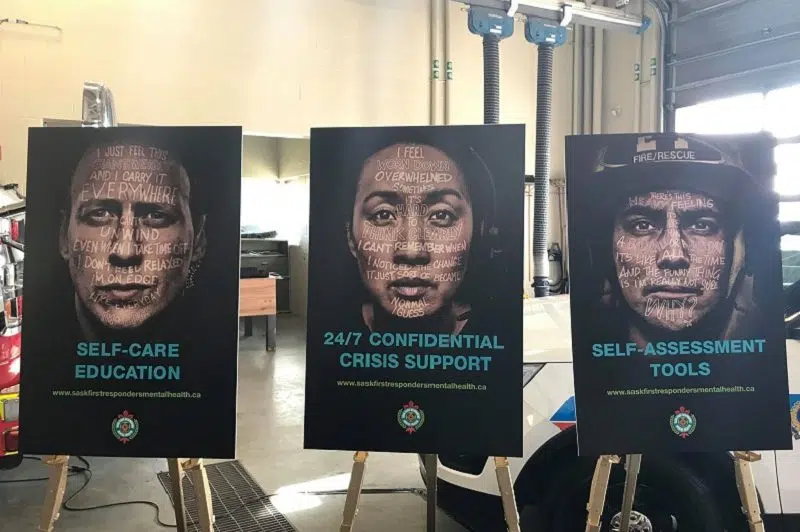First responders now have better access to mental health support, thanks to a new website launched Wednesday.
The website has online resources for first responder’s like EMS, police, fire fighters and dispatchers to access anonymously and 24/7. Resources include a self-assessment test which can then be taken to a doctor, self-care tips and information for making a mental health insurance claim.
First responders were at the launch event, along with representatives from the Saskatchewan First Responders Mental Health Committee, Saskatchewan Workers Compensation Board and a family member of a first responder who lost their life due to work trauma.
The resource is the culmination of nine months of work on behalf of WorkSafe Saskatchewan, which partners with the Workers Compensation Board and the Ministry of Labour Relations and Workplace safety.
Chief Evan Bray with the Regina Police Service said the biggest challenge in addressing mental health among first responder’s is finding out how to reduce the stigma.
“We’ll talk about a broken leg, one of the officers breaks their leg, everybody knows what happened … but mental health is so different,” said Bray. “We have people at the police service right now that are seriously suffering from mental health issues, but are reluctant to come forward and talk, not just because of the stigma but because they don’t want to let the team down.”
Kevin Mooney with the Saskatchewan Worker’s Compensation Board (WCB) said the number of workplace mental health injuries continues to rise and such a resource is needed for the first responder community.
2017 research from the Canadian Journal of Psychiatry surveyed 6,000 first responders. Among those surveyed, 45 per cent screened positive for occupational stress injury, which is four times higher than average.
WCB data also indicates that exposure to traumatic events is now a common cause of injury, and first responders are at a much greater risk of experiencing a traumatic event.
Paul Hills, President of Saskatoon EMS said the need for mental health resources among first responders is important.
“We change over the years,” said Hills, who also offers anonymous counselling services to his paramedic staff and is an advanced care paramedic. “While I was doing (research) I didn’t even realize the stuff I was reading would eventually hit close to home.”
Candace Curl, who lost her paramedic brother to suicide last year also spoke at the event to discuss the importance of mental health resources to both first responders and their families.
Curle said the trauma her brother Robbie had seen during his 18 years as a paramedic took its toll on him.
“Robbie was a hero to every person whose life he saved, dignity he preserved, and family he comforted,” said an emotional Curle. “He was also a hero as he fought demons that none of us could see for close to a decade.”
Curle said she’s hopeful that mental health initiatives like the website can effectively help treat mental health for all first responders.
Jeff Reeder, Chair of the Sask. First Responder’s Mental Health Committee who helped create the program said it’s a relief to have the program up and running.
“It’s a huge thing to see to fruition,” said Reeder.
“I’ve had my own personal journey with post-traumatic stress and I’m a testament that you can heal from this. It’s not a lie; long debilitating illness or injury, just sticking with it and getting access to the treatment can get you back to work and functioning again.”
Reeder said the program hopes to expand to add an online psychiatry component to the website to better assist rural communities in the province.
The website can be accessed here.







